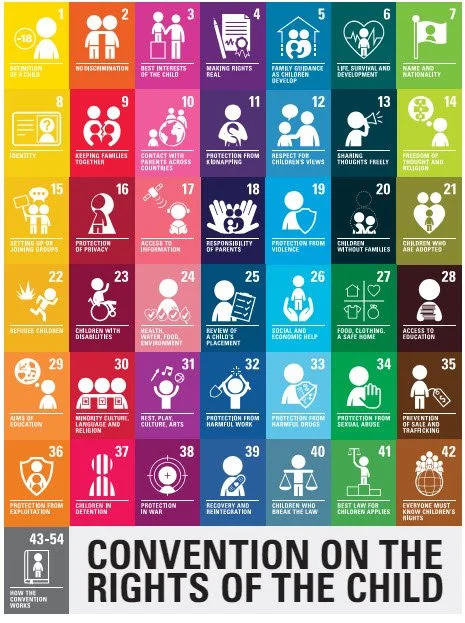A call to uphold children’s rights in decision-making
In recent months a number of announcements have been made by the government that relate to children’s education. These include regulations on the use of cell phones at school, an attendance action plan and a review of Ka Ora, Ka Ako | Healthy School Lunches programme. Despite the significant impact of these proposed and actual changes on children’s lives, to date, children have been largely invisible in the decision-making processes. In fact, the way these decisions have been made, raises questions about the extent to which children’s rights are being realised in Aotearoa New Zealand.
The Rights of Children
Aotearoa New Zealand’s ratification of the United Nations Convention on the Rights of the Children (CRC) in 1993 amounted to a promise to every child that their rights would be upheld in all circumstances. The bespoke set of rights for children guaranteed under the CRC complements other rights conferred on children under te Tiriti o Waitangi, the United Nations Declaration on the Rights of Indigenous Peoples, and the United Nations Convention on the Rights of Persons with Disabilities. Collectively, these rights are intended to ensure every child in Aotearoa can thrive.
Right to participate in decision-making
Article 12 is among the most significant of the rights afforded to children under the CRC. It assures children the right to express their views in all matters affecting them and to have their views given due weight in accordance with their age and maturity. Simply listening to the child is insufficient; the views of the child must be seriously considered. This recognises children as active citizens, who are key agents for social change (United Nations, Child Rights and the 2030 Agenda for Sustainable Development).
Lundy (2020) refers to Article 12 as a barometer for the other rights in the CRC. When children are given an opportunity to express their views on matters affecting them, and their views are given due consideration, it is much more likely that their other rights will be protected. In an education context, the Committee on the Rights of the Child (the United Nations body tasked with monitoring the implementation of the CRC), has emphasised that respecting the child’s right to participate in decision-making, is fundamental to the realisation of the right to education.
Clearly then, realising the child’s right to meaningfully participate in education decision-making, including at the highest levels in law and policy making, is of utmost importance.
Children’s call to action: Who is listening?
The importance of these matters to children and their desire to have their views heard is evident. In response to planned cuts to Ka Ora, Ka Ako | Healthy School Lunches programme, children and young people from six Wellington schools visited Parliament with a petition calling on the government to continue funding the programme. Sharing their first-hand experience of the impact of free school lunches on student wellbeing and learning, the children’s message was clear – save school lunches!
Actively seeking, listening to and considering the views of children is crucial to developing an education system that is relevant and responsive to children’s needs. Given their intimate understanding of the issues impacting their lives, children and young people are uniquely placed to offer innovative and effective solutions to the challenges facing the education system. Failing to listen to their views is not only a human rights violation, it is a missed opportunity.
Brief Bio
Dr Nicola Leete is a lecturer in the Specialist Teaching programme, Institute of Education, Massey University. Her teaching and research focuses on education law, human rights and inclusive education.
References
Dexter, G. (2023, April 10). Students petition parliament to keep free school lunches. Radio New Zealand. https://www.rnz.co.nz/news/political/513956/students-petition-parliament-to-keep-free-school-lunches-funding
Lundy, L. (2020, November 16). Voice is not enough: The Lundy Model and early childhood education [Conference presentation]. Charles Sturt University Early Childhood Voices 2020 Conference, New South Wales, Australia. https://www.youtube.com/watch?v=U8oGktRUO0k
Te Tiriti o Waitangi, 1840.
https://waitangitribunal.govt.nz/treaty-of-waitangi/te-reo-maori-version/
United Nations Committee on the Rights of the Child. (2009, July 1). General comment No. 12 on the right of the child to be heard (art. 12).
https://www2.ohchr.org/english/bodies/crc/docs/advanceversions/crc-c-gc-12.pdf
United Nations Convention on the Rights of Persons with Disabilities, March 30, 2007.
United Nations Convention on the Rights of the Child, November 20, 1989.
https://www.ohchr.org/en/professionalinterest/pages/crc.aspx
United Nations Declaration on the Rights of Indigenous Peoples, September 13, 2007.
United Nations Human Rights, Office of the High Commissioner. (2020). Child rights and the 2030 Agenda for Sustainable Development.
https://sustainabledevelopment.un.org/content/documents/26130Child_Rights_2030_Agenda_HLPF_2020.pdf

